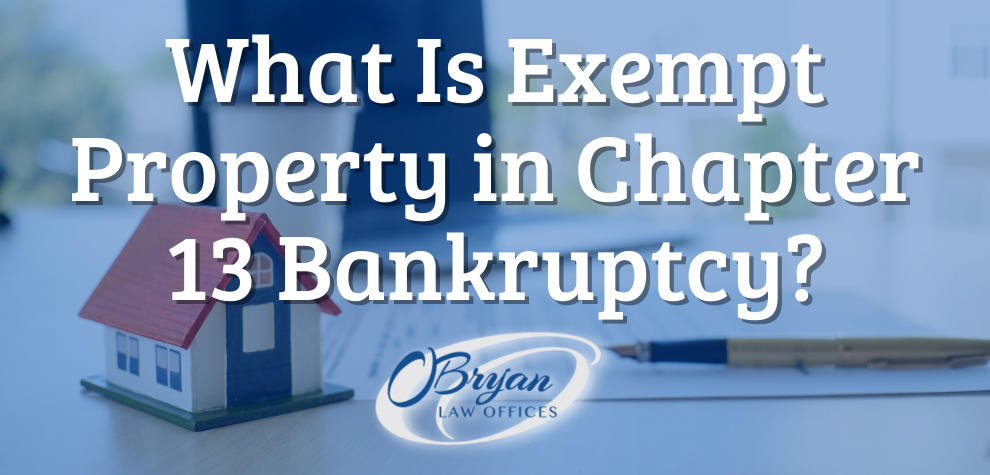Exemptions from bankruptcy assist filers get a fresh start by allowing them to keep the property they’ll need to keep a house and a job. Kentucky bankruptcy exemptions also play a role in determining how much a debtor will have to pay in a Chapter 13 repayment plan. Exempt property in Chapter 13 often affects payment amounts. Therefore, we recommend speaking with a Louisville bankruptcy attorney to learn more.
At O’Bryan Law Offices, we understand that bankruptcy often stresses even the calmest of people. That’s why we offer consultations at no cost to our clients. The good news is that you can keep your property after filing for Chapter 13 bankruptcy. However, it comes with a price. As the debtor, you must pay the value of that nonexempt property over a 3 to 5 year period. The rest of this blog discusses the nuances of exempt property in Chapter 13. For more information, or to schedule your consultation, please call our office at 502-339-0222.
How to Keep Property Using Bankruptcy Exemptions
When you file for bankruptcy, you don’t lose everything, but you also don’t get to pick what you keep. Instead, you’ll begin by examining the bankruptcy exemption regulations in your state. They’ll assist you in determining how much property you’re allowed to keep. Whether you apply for Chapter 7 or 13, the exemptions cover the same amount of property.
Most states provide a homestead exemption that will protect some of your home’s equity, or if your state law enables you to select between state and federal bankruptcy exemptions, you may choose to go with the federal bankruptcy exemptions. Homestead amounts differ substantially between states, so if yours is among the smaller ones, see whether you qualify for a wildcard exemption. You might be able to use it in conjunction with the homestead exemption to safeguard even more equity. Any assets you can’t safeguard with a bankruptcy exemption are considered nonexempt, and creditors will be entitled to a similar amount of money.
Why Does Exempt Property in Chapter 13 Matter?
You agree to repay all or a part of your obligations over time in Chapter 13 bankruptcy. In exchange, you get to retain your home. You offer a repayment plan via bankruptcy, which the court subsequently authorizes. The majority of plans span between three and five years. During the repayment term, you pay a fixed sum to the bankruptcy trustee assigned to your case on a monthly basis. The trustee then distributes the money to your creditors.
Of course, the majority of individuals want to know how much their monthly payment will be. Keep in mind that constructing a repayment plan that follows all requirements is difficult, to the point that bankruptcy attorneys utilize software to do it. To put it another way, here’s how exemptions work in general.
First and foremost, creditors in a Chapter 13 case must get the same amount of money or more than they would in a Chapter 7 bankruptcy case. As a result, if the Chapter 7 trustee may sell property for the benefit of creditors in a Chapter 7 case, creditors in a Chapter 13 case should at least get the same amount.
So, how do you calculate the amount that creditors should receive? It’s actually rather simple. It’s the debtor’s nonexempt property’s worth. A Chapter 13 debtor must pay to maintain property that would have been lost if the debtor had filed for bankruptcy under Chapter 7.
Kentucky State Law Regarding Chapter 13 Exemptions
The types of property you can exempt, as well as the quantity of property you can exempt, differ by state. You will be required to use state exemptions in most states. Some states, on the other hand, enable you to select between state and federal bankruptcy exemptions. However, how long you’ve resided in the state counts. If you haven’t relocated recently, you can take advantage of your home state’s exemptions.
Kentucky Homestead Exemption
You can preserve up to $5,000 in equity in any Kentucky real or personal property that you use as a regular residence. You can safeguard a burial site for yourself or a dependent with your homestead exemption, according to Ky. Rev. Stat. Ann § 427.060 & 090.
Kentucky Motor Vehicle Exemption
According to Ky. Rev. Stat. Ann. 427.010, you can use accessories to safeguard up to $2,500 of equity in a single car. Certain occupations allow for the storage of extra cars.
Kentucky Wildcard Exemption
According to Ky. Rev. Stat. Ann. 427.160, you have the right to keep any real or personal property worth up to $1,000.
Other Exemptions in Kentucky
- Awards and alimony: Alimony payments that are necessary for you and the support of your dependents. Reparation funds for crime victims. Wrongful death awards. Up to $7,500 in a personal injury settlement award. Loss of consortium awards. Awards for loss of future earnings.
- Insurance: Proceeds or benefits from a cooperative life or casualty insurance company. Proceeds from life insurance. Group life insurance proceeds.
- Personal property: $3,000 in clothing and household items. $3,000 in equipment, farming tools, and livestock. Prescribed health aids for the debtor and their dependents.
- Pensions and retirement accounts: ERISA-qualified retirement accounts. Pensions for police and firefighters. County and state employee pensions. Teachers’ pensions.
- Public benefits: Public assistance. Unemployment benefits. Workers’ compensation benefits.
- Tools of the trade: Up to $300 in tools to use in a profession or trade, plus $2,500 for a mechanic’s vehicle. Up to $3,000 in farming tools. Maximum $1,000 in professional office and library equipment, instrument, or furnishings for an attorney, minister, veterinarian, physician, or dentist.
How Does Exempt Property in Chapter 13 Affect My Repayment Plan?
A debtor must assess their income, property, obligations, and costs while creating a Chapter 13 repayment plan. The debtor’s discretionary income and the value of their non-exempt property are the most important considerations in this circumstance. Calculating your disposable income entails deducting your living costs from your monthly earnings. The figure must then be multiplied by the number of months in your payback plan, which will span three to five years.
Meanwhile, you’ll need to figure out which assets are exempt and deduct that amount from your overall asset worth. In some circumstances, an item may be exempt only in part because its value exceeds the exemption’s value.
You must pay the bankruptcy trustee the larger of the two sums once you have determined the value of your disposable income and the value of your non-exempt property. They’ll put it towards repaying your unsecured obligations. Secured debts are those that are tied to a specific asset and are paid first. If the trustee sells the asset, creditors who are due these obligations must be paid first and in full.
How to Calculate Nonexempt Property Value
You’ll probably want to start by making a list of everything you own and how much it’s worth. Then you’ll go through your state’s exemptions (or federal exemptions, if you’re eligible and it makes more sense). Finally, you’ll figure out what’s exempt and how much any nonexempt property is worth.
Here’s an example. You have a harpsichord valued at $2,500. Your state allows up to $5,000 in exemptions for musical instruments. You can keep the harpsichord because it does not exceed the exemptions. However, if your state does not have exemptions for musical instruments, you must pay at least the value of the instrument to your creditors. These payments happen through your Chapter 13 repayment plan.
Calculating Your Chapter 13 Repayment Plan
It’s not simple to figure out if you’ll be able to keep your house if you file for Chapter 13 bankruptcy. Why? Because you must first compute your complete repayment plan—and the amount you owe to each creditor might quickly add up. Begin by subtracting your monthly living costs from your earnings. You’ll need to pay for the following with the remaining funds.
- Car payments and monthly mortgage payments, unless you intend to give the lender back the collateral property
- Full amounts of missed mortgage payments, car loan payments, or other types of secured debt payments
- Total amounts of priority debts you owe, like taxes or support obligations
- Value of nonexempt property
- Other disposable income amounts that remain once you pay the previous expenses
What Property and Debts Increase Your Chapter 13 Payments?
You should be able to get your Chapter 13 repayment plan authorized if you have a significant income and do not own a significant amount of non-exempt property. This is a common situation for those who file under Chapter 13. They make enough money to keep their assets from being liquidated under Chapter 7, but not enough to pay off their debts and keep up with the cost of living in their region. In the meantime, they may not have purchased a home or other significant property.
On the other hand, if you don’t make much money and possess a lot of non-exempt property, it could be more difficult to get your plan approved. A good-faith condition must be met when filing under Chapter 13. This means that a debtor must pay at least the value of their non-exempt property while contributing all of their disposable income to the repayment plan. If you own a home and drive a car but just make minimum income, Chapter 13 may not be an option for you.
Even under a five-year plan, your discretionary income may not be sufficient to meet the minimum necessary payment. In this situation, a debtor may opt to sell high-value assets to aid in paying off obligations rather than filing for bankruptcy. Alternatively, they may sell their assets to decrease their debt and then file for bankruptcy under Chapter 7 or Chapter 13 to deal with the excess.
Contact O’Bryan Law Offices Today
At O’Bryan Law Offices, our experienced Kentucky bankruptcy attorneys have a wealth of knowledge surrounding bankruptcy in our state, as well as in Indiana. If you or someone you know struggles with their finances, we’re here to help. Please contact our Louisville bankruptcy office today at 502-339-0222 or fill out our online intake form to schedule an appointment with us.








